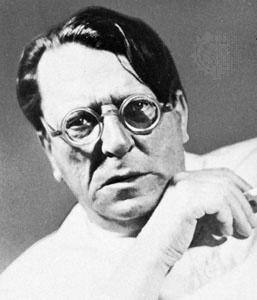Schickele, René
German writer
born Aug. 4, 1883, Oberehnheim, Alsace
died Jan. 31, 1940, Vence, Fr.
 German journalist, poet, novelist, and dramatist, whose personal experience of conflict between nations made his work an intense plea for peace and understanding.
German journalist, poet, novelist, and dramatist, whose personal experience of conflict between nations made his work an intense plea for peace and understanding.Schickele was active as a foreign correspondent, editor, and, from 1915 to 1919, as the publisher of the Weissen Blätter (“The White Papers”), which he had transferred from Berlin to Zürich and which he made the most effective mouthpiece of European anti-war sentiment during World War I.
Peace and the resolution of cultural and political conflicts between France and Germany, which as an Alsatian he felt keenly, were the goals Schickele pursued throughout his life. Divided loyalty between Germany and France was already manifest in the theme and style of his first collection of poetry, Der Ritt ins Leben (1905; “The Ride into Life”), and in his first novel, Der Fremde (1907; “The Stranger”). This conflict was powerfully dramatized in Hans im Schnakenloch (1916; “Hans in the Gnat Hole”), in which the protagonist, Hans, must choose between Germany and France in time of war; torn within himself, he seeks death in the French Army, which he expects to be defeated. After having a considerable popular success, the drama was banned in Germany and condemned in France.
In his best known work, the novel trilogy Das Erbe am Rhein (“The Inheritance on the Rhine”)—comprising Maria Capponi (1925), Blick auf die Vogesen (1927; Heart of Alsace), and Der Wolf in der Hürde (1931; “The Wolf in the Pen”)—Schickele suggests that the ideal meeting ground for the creation of the supernational European is the area between the Schwarzwald and the Vosges mountains, where French and German cultures meet and fuse. In 1932 Schickele fled Germany for France and became a French citizen.
- Congregation of the Mission
- Congressional Quarterly
- Congress Kingdom of Poland
- Congress, Library of
- Congress of Aix-la-Chapelle
- Congress of Berlin
- Congress of Chilpancingo
- Congress of Laibach
- Congress of Racial Equality
- Congress of the People
- Congress of the United States
- Congress of Troppau
- Congress of Tucumán
- Congress of Verona
- Congress of Vienna
- Congreve, Richard
- Congreve, Sir William, 2nd Baronet
- Congreve, William
- congé d'élire
- Coniacian Stage
- Conibear, Hiram Boardman
- conic section
- conidium
- conifer
- coniferous forest